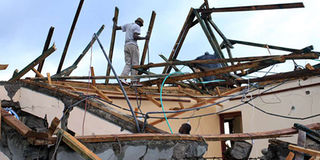Evictions go against ethos of Uhuru’s ‘Big Four Agenda’

Residents of Ruai in Nairobi are left homeless after their houses were demolished, on May 16, 2020. PHOTO | FILE | NATION MEDIA GROUP
What you need to know:
- To govern means exercising responsibly, the mandate bestowed upon the government by the people in a democratic State.
- Sole responsibility lies with the government to help Kenyans to realise their right to shelter, more so for those with low purchasing power.
President Uhuru Kenyatta began his second and final term with a bang and full of fresh ideas.
One of those is the ‘Big Four Agenda’, which includes the affordable housing pillar. A fantastic idea.
Groundbreaking ceremonies have since been held and construction of some flats has got off the ground. Sadly, that pillar is now tainted by all the evictions happening countrywide.
Nairobi started with Kariobangi North and Ruai. Mombasa followed with attempts to demolish an estate in Changamwe and, before that, Dunga Unuse slum.
Giving with one hand and taking with the other is an accepted norm for governments but is, of course, detrimental to the citizens.
Some of the parcels of land in question, we now learn, are public land. People made their homes here. Let us not mistake a house for a home.
The latter, in the eyes of the law, could be anywhere and anything one calls home and can prove through conduct, the long-term relationship between the person and the home. This could be a hole in the ground, a mud hut, a mansion or even a carton house in a slum.
Most of those being evicted have lived in those areas for more than 50 years. That is a lifetime of memories comprising weddings, births and funerals, not to mention strong community bonds established.
OFFER ALTERNATIVES
The Kariobangi, Ruai and Changamwe evictees have duly qualified to retain their homes through the ‘adverse possession’ rule. Their long-term occupation of the land engendered automatic legal ownership. That is a rule that clearly gets overlooked.
It would still have been fair, even in the absence of the rule, to compensate them fully for their investment, to help them to rebuild elsewhere.
Even if the government just woke up and discovered 100 years later that it had land it wanted recovered, it should still have remembered it has a duty of care to evictees and provided them with alternative places to establish homes.
In all the eviction cases involving the State, it has behaved as if those evicted are not under its care. There is no greater injustice we have helplessly witnessed these past few weeks than families forced out into freezing nights in the middle of a pandemic. Narcissism does not come any better.
How much worse could we do to each other if those with the responsibility of care behave in a cruel and callous way?
The government cannot claim to govern if all it does is turn on the citizens with impunity and brutality.
Being a government does not give an individual or the whole entity the right to unleash terror on the citizens and carry out mass evictions at will.
SLUM PROLIFERATION
To govern means exercising responsibly, the mandate bestowed upon the government by the people in a democratic State.
The constitution as a social contract entered between the government and the citizens does not say that the latter have pawned their safety away in order to be brutalised and their possessions mangled by the former.
The latter is just a custodian of the Constitution and public resources, which need to be divided equitably.
Anecdotally, Kenya has beaten its own record of pushing the most people into slums, especially in Nairobi. The problem has since spread to other parts of the country.
Mombasa, where I grew up, was not known for slums but they have become the unlikely backdrop to the Indian Ocean.
The estate earmarked for demolition in Changamwe was the pride and joy of the residents and the best example of affordable housing. It is now an eyesore.
The residents claim to have been left to their own devices for years by subsequent corrupt county administrations.
The residents claim that they used their own money to maintain the houses, which the authorities now want to take back without full compensation. How unjust!
BASIC NEED
Sole responsibility lies with the government to help Kenyans to realise their right to shelter, more so for those with low purchasing power.
Our Bill of Rights talks of the right to protection of property at Article 40 and economic and social rights at Art. 43.
Which means provision of shelter is not just a moral and ethical issue but a legal matter, too, that the government is not taking seriously, hence exposing its character of impunity further with the latest evictions.
The affordable housing pillar of Big Four now rings hollow amid the evictions being sanctioned by the State.
I say sanctioned by the State as disregarding court orders by officials, particularly the police, amounts to the government’s acquiescence to the demolitions and vitiation of the rule of law.
It is one thing to ask the citizens to be proactive in making their lives better, (By George, Kenyans are proactive!) but another to destroy their dreams and livelihoods through terror.
And what, or whom, is the government governing if the citizens are suffering at its hands? Housing the citizens is its duty, after all.
Ms Guyo is a legal researcher. [email protected]. @kdiguyo





